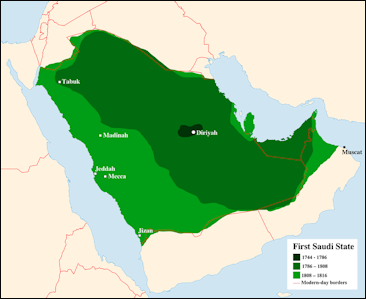factsanddetails.com WAHHABISM Flag of Saudi Arabia Wahhabism---a strict, back-to-basics form of Sunni Islam which emphasizes religious purity, strict
factsanddetails.com
WAHHABISM
Flag of Saudi Arabia Wahhabism—a strict, back-to-basics form of Sunni Islam which emphasizes religious purity, strict adherence to Islamic law and a literal interpretations of Islamic texts—was founded in the18th century by Mohammed ibn Abd al-Wahhab, a theologian from the Najd area of Arabia. It is the predominate form of Islam found in Saudi Arabia and has been spread around the world with the help of Saudi we alth.
alth.
Wahhabi fundamentalists insist that they do not interpret Islamic texts but simply follow their exact, unambiguous meanings. They reject centuries of legal scholarship as unnecessary “innovation” and regard many Western values as un-Islamic. Christians and non-Wahhabi Muslims are regarded as “unbelievers” who should be avoided. Many of their beliefs aren’t that much different from those of the Taliban.
Steve Coll wrote in The New Yorker, Saudi Arabia’s “dominant school of Islam is often called Wahhabism by non-Saudis, in reference to Muhammad bin Abdul Wahhab, an eighteenth-century desert preacher who allied himself with the al Saud family when it first established political control over the Arabian Peninsula, and whose descendants are still among Saudi Arabia’s most important official clergy. Many Saudis reject the term “Wahhabism” as pejorative; they regard Wahhab’s ideas as Islam itself, properly interpreted, and they argue that no other label is required. Some Saudis acknowledge their country’s dominant theology as a distinct school of Islamic thought, but they will typically refer to this school as Salafism, a term that refers to the beliefs and practices of the earliest followers of Islam. With some exceptions, adherents of the Salafi school steer away from purposeful political organizing; instead, they often emphasize matters of personal faith, such as the strict regulation of Islamic rituals, and of an individual’s private conduct and prayer. Bin Laden’s group at Al Thagher, Batarfi said, was influenced to some extent by Salafi ideas, because there was no escaping the presence of such ideas in Saudi society, but bin Laden’s group adopted “a more activist or a political agenda,” as Batarfi put it, which was drawn largely from the Muslim Brotherhood’s advocacy for political change in Islamic countries. [Source: Steve Coll, The New Yorker, December 12, 2005]
Wahhabi Beliefs
Wahhabis call for a return to the doctrines and practices of early Islam. Islamic laws are expected to be followed. The veneration of any person, living or dead, is regarded as an attempt to play god, a crime punishable by death. Wahhabis believe that those who flout God’s commandments will burn in hell and that many common place, ordinary things have negative, immoral associations and thus should be avoided.

Flag of ikhwan One Wahhabi imam told the Washington Post, “For example, if you go home and watch TV every day.”.that’s not going to help you get close to God. If you go out to the game.”.or you go to the movies, often if you ;love to go to parties, if you like music—all these things are not going to bring you closer to Allah.” Also forbidden are “love letters, or chatting, in the chat room without the presence of a guardian.”.or writing e-mails, that you know you have no business writing.”
Xenophobia and intolerance are recurrent themes in modern Wahhabi texts. They urge their followers to avoid smiling at infidels, wishing them well on holidays and calling them friend. A revered imam issued a fatwa that told the faithful living abroad should “harbor enmity and hatred for the infidels and refrain from taking them as friends.” Nonbelievers—including Shiites and Sufis—are regarded as infidels deserving of punishment.
Many Wahhabi beliefs are rooted more in Bedouin social norms than Islamic jurisprudence. Wahhabis oppose almost all forms of modernization. Sometimes their views seem quite heartless. The Saudi Wahhabi Shiek Abdel Aziz Fawzan said the 2004 South Asian tsunami was God’s punishment for the beach resorts allowing “people at Christmas, fornication and sexual perversions of all kinds are rampant.” Some Christians do the same thing. Evangelical Christian Jerry Fallwell made a similar remark about the September 11th attack on New York.
See Taliban
History of Wahhabism

Ikhwan In 1745, Abd al-Wahhab (1703-87), a devout Muslim who regarded the form of Islam practiced in Arabia as corrupt, vowed to return Islam to its original precepts—no idols, no saints and intermediaries between man and God—and launched a campaign of purification and renewal in which Muslims were urged to return to the pure and authentic Islam of Mohammed’s time. Wahhab was greatly influence by the Koranic literalism of Ahmad ibn Hanbal (died 855). He felt Islam was being overrun by superstition and Sufi existentialism and viewed the Ottoman Turks, who were Muslims and ruled the Middle East, as corrupt apostates worthy of death. He created a small community of faithful who shared his strict beliefs.
The Wahhabi cause was embraced by the rulers of the Najd area, and by force it was spread across Arabia before being stopped at the end of the 18th century by the Ottoman sultan, who had been accused by the Wahhadis of being a derelict Muslim and an usurper of the Muslim state. A resurgence of Wahhabism occurred in the waning years of the Ottoman Empire and continued after its collapse. Wahhabism was embraced by Ibn Saud, Saudi Arabia’s first king. It was given a boost when Saud captured the holy cities of Mecca and Medina.
In the 20th century Wahabbism became the official ideology of Saudi Arabia and spreading it became a key feature of Saudi Arabia’s foreign policy after the oil boom in the 1970s. The campaign to spread Wahabbism overseas was motivated in part by the threat of presented by radical Shiite Islam after the 1979 Iranian revolution an was intended to be a counter-measure to that.
Salafism

Ibn Saud Salafism is a belief closely tied with Wahhabism. Its followers attempt to imitate the Prophet Mohammed and his 7th century companions by practicing their faith as closely as the can to a medieval ideal and even dressing like 7th century Muslims. Wahhabism is regarded as an ultra-conservative brand of Salafism. Both beliefs stress a return to “pure” and “authentic” Islam.
On his experience with the group, Mansour al-Nogaidan, a Bahraini-based journalist, wrote in the Washington Post, “I joined a hard-line Salafi group. I abandoned modern life and lived in a mud hut, apart from my family. Viewing modern education as corrupt and immoral, I joined a circle of scholars who taught the Islamic sciences in the classical way, just as they had been taught 1,200 years ago. My involvement with his group led me to violence, and landed me in prison. In 1991, I took part in firebombing video stores in Riyadh and a woman’s center in my home town of Buraidah, seeing them as symbols of sin in a society that was marching rapidly towards modernization.”
Ihsan Bagby, a professor of Islamic Studies at the University of Kentucky, told the Washington Post , “Salafis are the fundamentalist of the Muslim world. Just as Christian fundamentalists are focused on who’s going is heaven and hell, who’s the true believer and who’s the nonbeliever,” Salafis “are really focused on belief.”.For the most part they are apolitical.”
Peter Mandaville of George Mason University told the Washington Post, “Salafi teachings begin to be more attractive to more Muslims as a defensive response. In the face of this new global war on Islam, they are saying, we will hold fast and emphasize anew the fundamental tenets of our faith.”
Wahhabi in Saudi Arabia

First Saudi State Wahhabi values and beliefs are indoctrinated in Saudi schools. A typical passage from a 6th garde textbook reads: “Arabs and Muslims will succeed, God willing, in beating the Jews and their allies.” A 10th garde textbook reads: “It is compulsory for the Muslims to be loyal to each other and to consider the infidels their enemies.”
The imam at the Sacred Mosque in Mecca has called Jews “pigs and monkeys,” described the West as a “poisonous culture” with “rotten ideas” and condemned Hinduism. Islamic scholars that expressed sympathy for the September 11th victims and suggested there be some common ground between Muslims and the West have been harangued and ridiculed.
The Saudi royal family are not big supporters of Wahhabism but their bond with the sect goes back to the 18th century and the feel they are not in a position to challenger it. Liberals are scared of them. One liberal Saudi told the New York Times, “If you are against them, you are against Islam. If you criticize them, you criticize Islam.
Spread of Wahhabism and Terrorism

Sultan Al-Otaibi The Saudi government is engaged in spreading Wahabbism with missionary zeal throughout South Asia, the Middle East and Central Asia.
Some 3,000 madrasahs have been set up with Zakat money—much of its supplied by Saudi ruling family in Pakistan and Central Asia. Money from the same sources has been used to build mosques in Indonesia and Islamic centers in Europe and the United States.
At these madrasahs, there is a very strong anti-West, ant-American slant. In many Osama bin Laden is applauded. The schools that produced the Taliban were founded with Saudi-Wahhabi money. See Pakistan
Osama bin Laden, the Egyptians who carried out the Luxor attack, Taliban-style guerillas in Kashmir , radical Algerians are influenced by Wahhabism. The Taliban originated in Saudi-financed madrasahs in Pakistan.
Explaining that links between Wahhabism and terrorism are unfounded one scholar told the New York Times, “Of course I hate you because you are Christian but that doesn’t mean I want to kill you.”
Image Sources: Wikimedia Commons
Text Sources: New York Times, Washington Post, Los Angeles Times, Times of London, The Guardian, National Geographic, The New Yorker, Time, Newsweek, Reuters, AP, AFP, Wall Street Journal, The Atlantic Monthly, The Economist, Global Viewpoint (Christian Science Monitor), Foreign Policy, Wikipedia, BBC, CNN, NBC News, Fox News and various books and other publications.
© 2008 Jeffrey Hays


COMMENTS